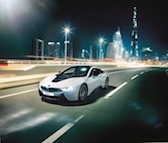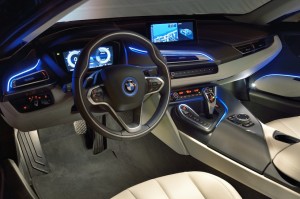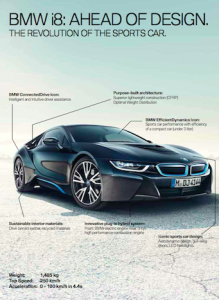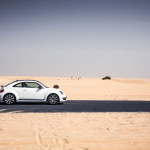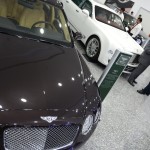Almost as fast as the Mercedes SL 55 AMG and almost as frugal as the Nissan Leaf, the BMW i8 spreads its wings in UAE showrooms this month. Will it fly on our roads? No reason why it shouldn’t.
I have spotted at least two Teslas between Yas Marina and Sheikh Zayed Road. Lexus has done its bit at the recent energy summit in Abu Dhabi. I caught sight of a Nissan Leaf, at least at the Dubai Motor Show, though I am yet to see one in my parking lot. We hear of the imminent arrival of the Audi A3 e-tron sportback. During Infiniti Q50’s first Press outing in the UAE, I was behind the wheel of the Hybrid 3.5. Promising! More than a year ago, I was there at the launch of the Fisker Karma. Given a line or two more, I am sure I could count eight. The omens are spot-on for BMW to present the ultimate hybrid sports car as it stealthily slides into our Bimmer showrooms this month, the BMW i8.
The BMW i8 follows the BMW i3 from the eco-friendly inner stables of BMW i, the sub-brand focusing solely on developing sustainable products and services. Both the exterior and interior of the 2+2-seater embody a completely new, exciting sports car design, which includes sophisticated aerodynamics features and environmentally friendly materials.
It comprises BMW LifeDrive architecture, the worlds’ first body architecture purpose-built for the series production of electric and plug-in hybrid cars. The BMW i LifeDrive architecture is made up of two separate units: the upper Life module that consists mainly of a high-strength and extremely lightweight passenger cell made from Carbon Fibre Reinforced Plastic – a first for a volume-production model. The lower drive module consists of a 100% aluminium construction and integrates the battery, electric motor and suspension system.
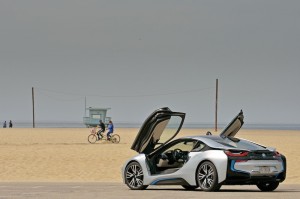 Powered by a 1.5-litre, three-cylinder BMW TwinPower Turbo petrol engine with a typical rear wheel drive, the BMW i8’s intelligent hybrid system also capitalises on a potent electric motor which powers the front wheels resulting in a combined power output of 362hp delivered to all four. The dual motors work in tandem to accelerate the BMW i8 from 0 to 100km/h in 4.4 seconds while using just 2.1 litres of petrol per 100kms and emitting just 59g/km of emissions.
Powered by a 1.5-litre, three-cylinder BMW TwinPower Turbo petrol engine with a typical rear wheel drive, the BMW i8’s intelligent hybrid system also capitalises on a potent electric motor which powers the front wheels resulting in a combined power output of 362hp delivered to all four. The dual motors work in tandem to accelerate the BMW i8 from 0 to 100km/h in 4.4 seconds while using just 2.1 litres of petrol per 100kms and emitting just 59g/km of emissions.
The top speed of the BMW i8 is as usual electronically limited to 250km/h. The all-electric drive (zero emissions) extends for around 37 kilometres – and the battery of the plug-in hybrid gets charged by the petrol engine while driving. Reasonably light at 1,485 kg, the total drive range extends to more than 500 kilometres.
The BMW i8 looks its part. Large front apron air intakes arranged over several levels generate a powerful feeling of depth. The broad BMW kidney grille stretches over to the slim headlights, while full-LED headlights are standard. The innovative laser headlights will be available as an option later this year, throwing light up to 600m – double the distance of conventional LED lights.
An all-pervading sustainability concept makes for carbon fibre production and vehicle assembly using 100-per cent renewable electricity; high proportion of recycled materials; use of materials manufactured and treated in an environmentally friendly manner.
Signalling the future of sustainable motoring, the BMW i8 combines the performance and appeal of a sports car with the fuel consumption of a small car, ensuring you and I can enjoy a few revs more than what save the earth councils might permit in the future is the likes of the BMW i8. But then, beginning with the first impression, there aren’t many in the likes of the i8.
Unladen weight 1,485 kg
Combustion engine: output 170 kW (231 hp)
Electric motor: output 96 kW (131 hp)
System output 266 kW (362 hp)
Combustion engine: torque 320 Nm
Electric motor: torque 250 Nm
System torque 570 Nm
Combustion engine cylinders / valves 3 / 4
Top speed 25 km/h
Top speed in electric mode 120 km/h
Acceleration from 0-100 km/h 4.4 sec
Range (overall / electric mode) 600 km / 37 km
Fuel consumption (EU) in 1/100 km 2.1
CO² emissions 49 g/km
Emissions standard EU6

